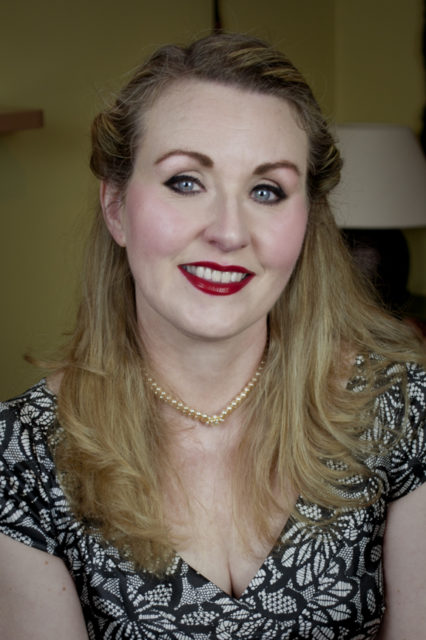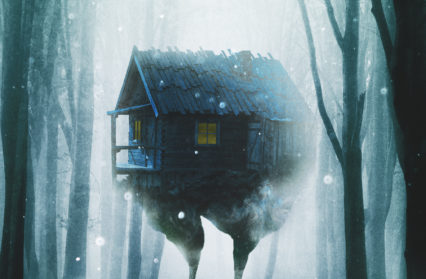Having just been selected for a new anthology of short fiction from writers across the world, exploring the world of the Baba Yaga, Welsh writer Catherine McCarthy reflects on fiction, folklore and drawing inspiration from her Welsh farmhouse.
Baba Yaga is arguably one of the best examples of a chaotic neutral character in the world of folklore. Of Slavic origin, in some ways she is a classic witch, and yet beneath the surface she is far more complex. She travels the sky in a pestle and mortar as opposed to a broomstick. She lives in a hut, deep in the dark woods, or at least the personification of a hut, as it is raised off the ground on chicken-leg stilts and sometimes wanders the woods of its own accord.
All of this is wonderful, but I think what appeals to me most about the Baba Yaga is her ambiguous and unpredictable nature. Unlike other witches, she is not purely evil. Instead, she is someone who stands between the protagonist and the objects they desire. One may approach her for help, and sometimes she will grant it, but believe me, it will come at a price. Baba Yaga is the kind of multi-dimensional character I love to write about.
Back last year, Lindy Ryan (award winning editor of Black Spot Books) put out a call for an all-female anthology called Into the Forest: Tales of the Baba Yaga. As soon as I saw it I knew I had to knuckle down and write a story. My chance of acceptance was low as the proposed anthology already included contributions from invited authors, so to say I was delighted when my story was accepted out of several hundred submissions from all over the world is an understatement. Lindy is such a well-respected editor in the world of horror, and to have my work appear in one of Black Spot’s anthologies is truly an honour.
I’m a Welsh author. I have lived in Wales my whole life, and the majority of the stories I write are set in Wales. Born and brought up in the Welsh valleys, I went on to teach for almost three decades. It is only recently I moved to West Wales where I now live in a two-hundred-year-old farmhouse which has its own stories to tell. Indeed, the day we moved in, the previous owner handed me a rusty old tin containing a bird skull and bones, an empty cigarette packet (Navy Cut Capstan) and a glass bottle stopper, all of which had been uncovered during the renovation of the house. It is said that the bones of small animals were sometimes buried within walls, above door lintels or in chimney stacks to ward off evil.
My heritage is Welsh, but that does not stop me being interested in tales from all around the world. No matter where a story is set you will find common tropes and themes, because after all, people are people the world over. We share the same joys, the same worries, the same hopes and fears. Those commonalities are what make stories not only accessible but enjoyable, regardless of where they are set because the human connection knows no boundaries. For example, the Japanese folktale, Momotarō, about a boy born from a peach and raised by a childless old couple, shares traits with The Gingerbread Man and also The Little Red Hen. What broadening the access to stories from around the world does is enrich the reader (or listener) with the sights, sounds and traditions from other cultures which is simply wonderful.
I consider myself one of the fortunate few, blessed with wealth and riches, not in a monetary sense but because during childhood my mother read or told me stories every single night without fail. And not only at bedtime but during the day, too. Memories of cooking with her in the kitchen while she told the tale of The Wolf and the Seven Young Goats (her version of course, which was much darker), or sitting at the table while she ploughed through a basket of ironing, listening to her version of The Little Match Girl (which always made me cry). Those memories taste as delicious as warm apple pie and custard, another of her specialities.
I believe it was my mother’s influence that drew me towards a career in primary school teaching. I wanted to share my love of literature and the magical portals stories and poetry can open. Teaching provided the perfect opportunity to develop my own story telling skills, as well as an understanding of how literacy can best be taught and acquired at a young age.
During those years, I often wrote short stories for the children and also wrote my first novel, a middle-grade dark fantasy adventure. However, it was not until I gave up teaching full-time that I was able to fully indulge my passion for writing. Teaching is such an intense career that it is hard to find both time and mental focus to commit to another occupation.

It could be said that I grew up in a female-dominated family since my mother had seven sisters, all of whom were very close. They all had stories to tell, most of which were either dark or darkly humorous, so this, along with my leaning towards the Gothic and the supernatural, was the catalyst, I believe, for my interest in writing dark fiction. These women were a force of nature. I suppose, because there were so many of them, they had to fight to some degree to be heard, and they were not afraid to argue the toss.
The world of horror writing has too long been dominated by men, especially middle-class white men, so to see editors like Lindy Ryan working so hard to change that focus is thrilling. There really is a strong movement within the horror writing community these days to ensure that not only women’s voices are heard and their stories told, but that these stories are diverse and all-encompassing.
In the anthology Into the Forest, you will find the more traditional tales of the Baba Yaga, but there are also stories with a modern slant, complete with cell phones, as well as a story set during the Second World War, and even a story where Baba Yaga falls in love. Something for everyone, I believe.
As for my own story, The Pedlar’s Promise, and without wanting to give too much away, I kept mainly within the parameters of the traditional Baba Yaga tale because this is the kind of story I love to read. However, I wanted to give it a fresh twist so I came up with the idea of Baba Yaga as a peddler who makes and sells ‘magical’ puzzle boxes, boxes that grant the one thing the heart desires most. However, the children who acquire them discover that the puzzle boxes can only be opened by boys.
There are two reasons I chose to do this. Firstly, I wanted to give a nod to the belief that no matter what a female desires, and no matter how hard she tries to achieve her goals, her actions are often thwarted, while things come more readily to males. This was particularly true in times past, when stories of the Baba Yaga originated. Prospects for females often consisted of mundane tasks and girls were taught to accept the inevitability of life’s disappointments.
It was not my intention to write an all out feminist story; my aim, rather, was to make a comment on female stoicism. There is a passage in The Pedlar’s Promise, where following the disappearance of several boys, the villagers gather together to discuss what can be done. It goes like this…
“It must be a trick,” someone said. “Our daughters are every bit as clever as our sons. Perhaps the boxes the pedlar gifts the girls are impossible to open.”
“Huh,” said a wise old woman. “Our daughters learn from an early age that what one’s heart desires can never be found inside a box, no matter how prettily packaged it comes. Better to accept life’s disappointments and get on with it. Whereas our sons—well, let’s just say they learn their lessons the hard way.”
Into the Forest: Tales of the Baba Yaga will be available in both paperback and ebook formats from November 8th 2022 and is available for pre-order.
Catherine McCarthy is a writer who loves to spin tales with macabre melodies from her old Welsh farmhouse. Her novel, A Moonlit Path of Madness, will be published by Nosetouch Press in 2023, alongside a novella, Mosaic (Dark Hart Books), and a YA novel, The Wolf and the Favour (Brigids Gate Press).
Catherine McCarthy Catherine McCarthy Catherine McCarthy Welsh Welsh Welsh












